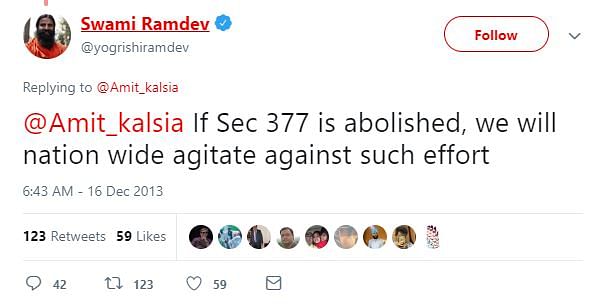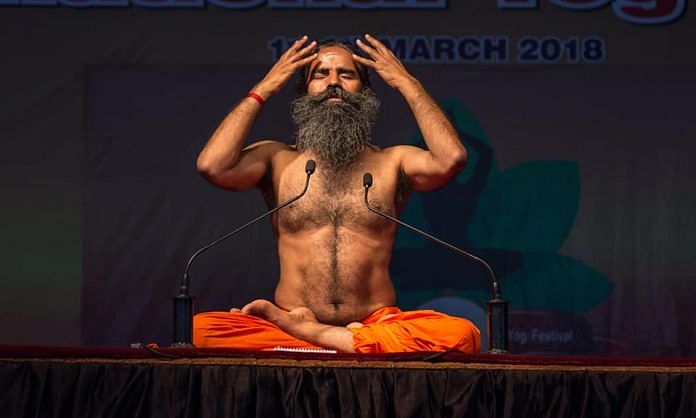The opposition to decriminalising homosexuality has dropped very quickly.
Baba Ramdev has maintained yoga could cure homosexuality, but has never shared which asanas could do the trick.
When the Delhi High Court’s 2009 decision to decriminalise gay sex was challenged in the Supreme Court, many new petitioners joined the cause of saving India from homosexuality. Among them was Baba Ramdev’s “disciple” and spokesperson, S.K. Tijarawala.
After the Supreme Court in 2013 re-criminalised gay sex, Baba Ramdev became television’s favourite poster boy in favour of Victorian morality. He went from one channel to another saying homosexuality was a disease, a mental health problem, it needed a cure, it’s not genetic, the Congress leaders are all gay, and so on.

But when lawyer Menaka Guruswamy filed a new writ petition, followed by a spate of supporting petitions, Baba Ramdev suddenly went silent. Tijarawala did not bother his lawyers with arguing in favour of 377 this time. I called and emailed Tijarawala asking him to explain what happened. He did not respond.
Also read: Take me as I am, says CJI Misra as Supreme Court frees India from Section 377
“I invite the gay community to my yoga ashram and I guarantee to cure them of homosexuality,” Ramdev said in 2013. Perhaps, the homosexuals have managed to cure Baba Ramdev.
Don’t call it love
The first legal support to Section 377 in 2010 came from a retired IPS officer and former BJP Rajya Sabha MP, B.P. Singhal, brother of Vishwa Hindu Parishad leader Ashok Singhal. He died in 2012. Singhal’s petition was a Google search compilation of the nonsense that Right-wing Christian groups in the United States put out.
I interviewed Singhal after the Delhi High Court judgment in 2009. It was funny to discuss anal sex and lubricants with a grandfatherly 78-year-old RSS thinker. Singhal argued that homosexuals should not be put in jail, but the law should stay as a deterrent to homosexuality spilling out into the open. It should stay under the radar as it had been. He was okay with sex in the bedrooms, but please don’t call it love.
Also read: Sometimes homophobic, sometimes liberal: BJP’s uneven Section 377 journey
Another petitioner, Purushothaman Mulloli, had a fancy south Delhi office ruled by his dog. His organisation is called ‘Joint Action Council, Kannur, India’, better known by the unfortunate acronym JACKINDIA. Mulloli of JACKINDIA wasn’t really bothered about sex. He thought the LGBT movement was a big pharma conspiracy to spread HIV-AIDS. His problem was with people making money. Legalising homosexuality would lead to gay pubs and bars, he told me, and newer avenues to make money.
Where are the haters?
In a country as large and as conservative as India, it is remarkable how few people have been raising their voices against LGBTQs. These voices have been fading out, and the petitioners in court have been dropping out.
Before the Delhi High Court read down Section 377 in 2009, queer people didn’t really exist in the mainstream imagination. After that judgment, there was an explosion of the LGBTQ movement in the media. The 2013 judgment was a setback, but the social floodgates had opened. It was clear this was going to last long.
The first person to appeal against the 2009 Delhi High Court judgment was an astrologer, Suresh Kumar Koushal. Others supporting him were All India Muslim Personal Law Board, Utkal Christian Council, Apostolic Churches Alliance, Delhi Commission for Protection of Child Rights, Tamil Nadu Muslim Munn Kazhgam, S.D. Pratinidhi Sabha, Raza Academy, Ram Murti, Bhim Singh, B. Krishna Bhat apart from Tijarawala, JACKINDIA and B.P. Singhal.
Also read: Section 377 verdict: Can we start calling the CJI the CEO of India?
These petitioners won in 2013 but cut to 2018 and we saw that many of them weren’t even marking their presence. Muslim and Hindu organisations were completely out of it. It’s as if they knew it was a lost cause now. Even the Christian organisations who argued in the court were small, marginal ones. The big, mainstream Christian associations in India stayed away from the debate.
Apart from the three Christian organisations, others supporting Section 377 in courts this time were JACKINDIA, a retired police officer K.K. Gautam who carried on the struggle of the late B.P. Singhal, and our random astrologer Suresh Kumar Koushal. Where did all the haters go?
The biggest change has been in the Bhartiya Janata Party, which was opposing decriminalisation before 2014 but went silent this time. The Modi government’s position to leave it to the wisdom of the court is a very big deal. A party of religious conservatives doesn’t oppose homosexuality? That’s how big the change in India has been.
Section 377 of the Indian Penal Code has existed for 157-odd years. The legal challenge to it began in the early 2000s. It may seem like a long time, but it has also been remarkable how quickly India has changed its attitude towards homosexuality.




The author has not made any attempt to find out why and how the BJP, and more significantly the RSS, changed their attitudes. The process of change in these two organisations is very crucial because it points the way to possible future liberalisation of their fundamentalist ideas. If RSS could mend itself in this matter, it can at some point of time, very well change its attitude to Muslims too. What a wonderful India it would be!
It’s seems The print is another leftist news paper. At least your entire media coverage feel give that the same message.
I don’t think the country will be free of the prejudice against the homosexuals as long as the mentality in the society against it prevails. The Supreme Court might have finally decriminalised Section 377 and rightly so, but it has to be admitted that the Indian mindset and the society is not welcoming to the gays. Legally LGBT community might have won a battle, but there is a war to be fought still… It is th war to destigmatise the society. Only then India would be able to call itself progressive.
Social morality cannot violate the rights of even one individual … A very powerful reassertion of the foundational principle of a democracy. Today’s judgment empowers and reassures all minorities, not just one, that they need not fear majoritarian pressures to conform to what a dominant group decides is good for everyone. The first parliamentary majority in a generation has spawned some theories, like there is now “ social sanction “ that beef should not be consumed. Hopefully, some of those excesses of emotion – Hamare paas bahumat hai – will begin to ebb away.